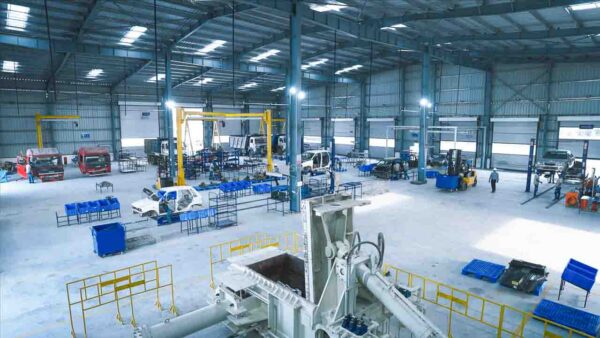Lakhs of LMVs in India are estimated to be over 20 years of age – Tata Motors intends to Re.Wi.Re some of them in their new facilities

Indian Government is pushing the automotive sector towards a greener future. Stricter BS6 norms were implemented in two phases, making sure that vehicles emit less pollution. Phase I was implemented in 2020 and Phase II will get mainstream after March 31st 2023. This is a major push as opposed to BS4 emission standards before.
Selling vehicles with fewer emissions is only half of the story. Scrapping older and unfit vehicles is the trickier part. This is where authorised scrapping partners like Tata Motors’ Re.Wi.Re programme comes into play. The first RVSF (Registered Vehicle Scrapping Facility) by Tata was inaugurated today by Union Transport Minister, Nitin Gadkari in Jaipur, Rajasthan.
Tata Re.Wi.Re Programme
In 2021, Tata Motors announced that they are on the verge of introducing vehicle scrappage facilities under a franchise model. Tata had approached their European partners to frame a holistic approach for a full-fledged vehicle scrappage facility model. LOI (Letter Of Intent) was sent out to dealer partners as well.
Result of which is Tata’s Re.Wi.Re programme, which abbreviates to Recycle With Respect. First of these state-of-the-art facilities was inaugurated in Jaipur today, on 28 February 2023. It is capable of scrapping upto 15,000 vehicles annually. It is established by Tata partner Ganganagar Vahan Udyog Pvt LTD to scrap EOL (End Of Life) PVs and CVs belonging to any brand.

This de-polluting facility is designed keeping eco-consciousness in mind. It is completely digitalized for hassle-free operations. There are various stations designated for dismantling tyres, oil, batteries, fuels, and gases. The facility is equipped to work with both PVs and CVs at the same time.
Minister Nitin Gadkari congratulated Tata Motors for setting up this quality facility which is at par with global standards. He further stated that there are efforts in place towards positioning India as a vehicle scrapping hub for the entire South Asian region. He urged that India needs more such state-of-the-art scrapping and recycling units in India.
Scrappage Policy By MoRTH
According to guidelines issued by MoRTH, all PVs above 20 years and CVs above 15 years have to undergo fitness testing under ATSs (Automated Testing Stations). For CVs, this rule will be set into motion from April 1, 2023 and for PVs, June 1, 2024. In case a vehicle fails to pass the test under ATS, it will be declared as an EOL vehicle.
The aim is to address unregulated CVs and PVs contributing to pollution. All will be scrapped. This ecosystem of scrapping old vehicles will give rise to sales of newer, greener and more fuel-efficient vehicles. Apart from reducing the carbon footprint generated by the automotive sector, the circular economy receives a major boost as well.
It is estimated that lakhs of LMVs (Light Motor Vehicles) on roads have crossed 20 years of age. To attract more vehicle owners to voluntarily opt for scrappage policy, state government’s have introduced road tax rebates too. With more and more scrapping centres set up, there will be numerous jobs generated.

